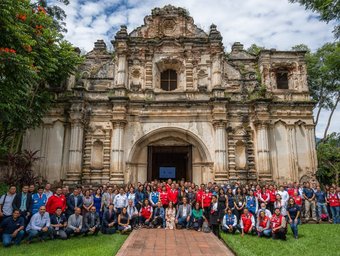The 4th Latin America and the Caribbean Regional Dialogue Platform: insights from the Future Leaders Network
The 4th Latin America and the Caribbean Regional Dialogue Platform, which was held around the theme ‘Scaling up and integration in disaster risk management systems’, allowed for the exchange of knowledge among actors from across the region. Among them were Christal Benjamin and Matias Menalled, who share their main takeaways from this event.
Christal Benjamin
Scale, integration, creativity… these are just three words which come to mind when I think about my experience at the 4th Latin America and the Caribbean Regional Dialogue Platform, where I had the opportunity to engage with fellow anticipatory actors. The platform provided us with a space to share information on progress made in anticipatory action and to discuss new initiatives for the region.
The platform featured sessions on several topics, including animal health, coordinated action mechanisms, forecast-based financing and drought mitigation. These emphasized the importance of scaling up anticipatory action and integrating it across sectors and disciplines, in order to address the underlying drivers of disaster risk and safeguard the lives and livelihoods of the most vulnerable people in our societies.
There was also a creative session, led by Pablo Suárez, associate director for research and innovation at the Climate Centre. I really enjoyed this session, as it highlighted the importance of art, music, games, dance and even cooking in disaster education. I had the opportunity to put this into practice when assisting the Anticipation Hub booth at the fair on anticipatory action initiatives, which showcased the work of the regional partners attending the event. The Anticipation Hub team engaged participants by asking them to spin a wheel, which prompted them to answer trivia questions on anticipatory action, come up with a headline they would like to read in 2030 about anticipation in the Americas, or wiggle to the rhythm of the Anticipation Dance. Participants enjoyed interacting with us and were happy to learn about the work of the Anticipation Hub and the Future Leaders Network.
This event was held at a very relevant time. Recent experiences with Hurricanes Ian and Julia are stark reminders of the need to strengthen anticipatory efforts in the region. It is now necessary to build upon the work already done, while seeking new and innovative ideas to reduce disaster risk in the region.
The Future Leaders Network on Early Warning Early Action
Through the Future Leaders Network, the Anticipation Hub commits to connect, inspire and empower future leaders across practice, science and policy, to work collaboratively on enabling early warnings that translate into anticipatory action on the ground. Its objectives are as follows:
- Connect: create an inclusive, fun and engaging networking space, both virtual and in person, to connect future leaders working in governments, universities, NGOs, the Red Cross Red Crescent Movement, UN agencies and others to exchange expertise and identify partnerships.
- Inspire: increase access to a supportive network of individuals who motivate and encourage one another, through the peer-to-peer and intergenerational exchange of experiences and by sharing inspiring stories of change.
- Empower: showcase initiatives led by early-career professionals and promote existing opportunities for training, learning and leadership, while creating and advocating for new opportunities in collaboration with the Anticipation Hub’s partners.
Matias Menalled
Participating in the 4th Latin America and the Caribbean Regional Dialogue Platform was an opportunity to learn, update and deepen my knowledge on integrating anticipatory action perspectives to improve early-warning systems. The Anticipation Hub brought together participants from various sectors and key actors from the countries in the region. This provided an opportunity for networking with a large number of professionals, experts and referents who work, day by day, in the development of new strategies and action plans that aim to reduce the negative impacts of natural and anthropogenic hazards, using evidence-based information.
I had the opportunity to participate as a speaker in the Ignite sessions, where I presented the work carried out jointly by the Argentine Red Cross and the National Water Institute to make progress in the recording and systematization of damages and socio-environmental impacts, with the aim of implementing impact-based forecasting in Argentina. The search for strategic alliances between the humanitarian sector, scientific–technical organizations and decision-makers is key for the implementation of approaches that are adequate for addressing the complexity of the crises we are currently facing.
A valuable lesson learned from the 4th Latin America and the Caribbean Regional Dialogue Platform is that it is possible to introduce a comprehensive understanding of risk scenarios as dynamic, changing and complex processes. This panorama confronts us with the need to update our analysis frameworks, action strategies and methodological approaches in order to integrate efforts and achieve better results.
During the event, there was also an opportunity to strengthen ties among the members of the Anticipation Hub’s Future Leaders Network. This network brings together young professionals from all over the world who are interested in generating dialogues and common actions that allow us to exchange knowledge and experiences. Meeting face to face at the dialogue platform, after an extended period in the virtual space, was very enriching and opened up new opportunities for joint work. In addition, we had the opportunity to make the network more visible to other regional leaders, with the vision of integrating new participants and those interested in supporting the project. We were honoured to join the Future Leaders Network as Latin American and Caribbean representatives, and we look forward to working with emerging disaster risk-reduction leaders in Latin America and the Caribbean to grow and strengthen the network.
This blog was written by Christal Benjamin and Matias Menalled. Christal is a research assistant specializing in disaster risk management at the Association of Caribbean States, Trinidad and Tobago. Matias is a scientific applications specialist in disaster risk management at the National Meteorological Service of Argentina.


